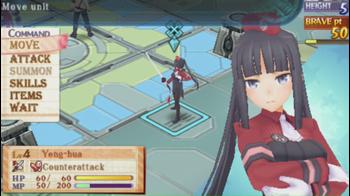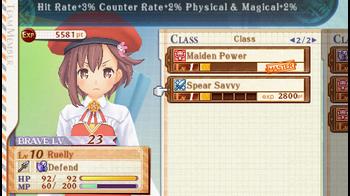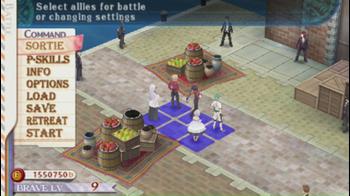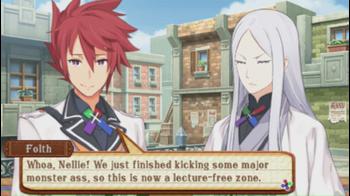
Summon Night 5 Review
While Sony's PSP has been fully discontinued for a couple years now, a few localization efforts still trickled their way into 2015 thanks to digital backwards compatibility on PlayStation Vita. Following XSEED's Brandish and Trails in the Sky, niche publisher Gaijinworks capped off the year with a release of Summon Night 5, the first mainline English release of Bandai Namco's strategy RPG series.
Alongside many, I wasn't all too familiar with the Summon Night series, which has only seen a few spinoff titles localized in English on the Nintendo GBA and DS. As an SRPG however, I knew I had to give it a shot.
Starting out, the player can choose a male or female protagonist as well as one of four partner creatures. As the game's title implies, the cast of characters in Summon Night are largely 'Summoners', each with a lifelong creature companion. These summoned beings are known in-world as a 'Cross'. In my case, I chose the male protag, Folth, and the humanoid robot, Dyth, as my main duo.
Summon Night 5 is a strategy RPG with several of the usual elements you'd expect for the genre. The game is divided into missions, and battles consist of individual units on a tactical grid.
Units move and act one-by-one in turns and can either use an attack, skill, or item. The game uses a team phase system, so all player units can act at once follow by whatever foe you are engaging.
Instead of using an intricate job system or relying on equipment management, Summon Night 5 simplifies things a bit on that front. The only equipment you can change on a character is a single accessory for slight stat boosts or added attack resistances. Weapons for characters are pre-set, but you can use items found in battles to upgrade their stats at the game's blacksmith. It keeps things pretty easy to manage.
Each mission rewards a set amount of experience, which is divided evenly among all active combat participants regardless of what that unit does in the battle. This EXP is stored for each character and can either be spent to level that character up or to have that character learn skills for use in battle.
As a character levels up, some stat points are automatically allocated while the player gets to choose some bonus stat-ups as well. Characters can be placed into "classes" that unlock either at certain levels or after certain missions. Classes effectively do two things: alter stat distribution and change what skills are available to use.
Most of the character skills are of the passive variety, which may up hit rates, damage with certain weapons, or chance to critical. Some of the more powerful skills include allowing a character to act again if they land a finishing blow on an enemy. All-in-all it's a pretty intuitive system that doesn't feel overbearing.
The variety in characters is passable. Some are more suited to magic-type abilities, and some more suited to positions up front as a sort of tank. To be truly effective in battle, you have to be aware of character strengths and weaknesses, but usually basic strategies are enough to overcome the challenge the game has to offer.
Summon Night is a snappy game. Load times are short and battles progress quickly and smoothly. Any battlefield action is accompanied by an animation, which can easily be skipped by a button press. The game doesn't waste the player's time, which I certainly appreciated.
Main mission objectives are simple and straightforward. Most of the time it's either: 'defeat all units' or 'defeat the boss(es)'. In fact, by end game, these objectives became somewhat stale as too many of the missions ultimately boil down to the same patterns many times over.
Each mission also has bonus objectives that can be met for other rewards. These can include not allowing any team member to fall, getting a certain number of kills from certain members, or taking out two enemies at once with a multi-target skill. These do add a little flavor and difficulty occasionally but even most of the bonus objectives are recycled too many times.
Any mission can be replayed so it's no big deal to retry objectives if you fail them the first time through.
The translation by Gaijinworks is often effective and colorful in the right ways, giving personality to each of the characters. The dialogue is sometimes clever, sometimes amusing, and sometimes just plain wacky, but it manages to work well most of the time. However, there are a few typos and editing errors throughout, especially one egregious one where a mission objective referred to the wrong character entirely.
Summon Night can also be described as part dating sim, which is true in the most basic of ways. After each main chapter of the game, you can choose one of the games many characters (of either gender) for a small chat about the current events in the story. These usually are only a few lines of dialogue and don't affect the actual gameplay of Summon Night except for a small part of the ending.
The character I chose to spend most of these nights with, Yeng-Hua, largely discussed the discrepancy between performing her duty as police and doing 'the right thing to do'. Her conversations with the main character didn't even turn romantic until the very last chat. While short, the character interactions still come across well enough.
However, the actual narrative writing of Summon Night 5 does little to maintain interest. The game opens up well enough introducing the player to world of Lyndbaum but as the conflict escalates, the story becomes more and more cliché and repetitive. Not only in the story beats, but in the battles that ensue, the player ends up taking on the same villains in the same types of battles more than a few times. The second half of the game drags hard on all fronts.
The presentation leaves a little bit to be desired as well. While the game is quite colorful both for models and backgrounds, character portraits animate awkwardly during dialogue and the PSP visuals take a little bit of getting accustomed to. There are no real cutscenes or even scene artwork to speak of either; all narrative is given though text boxes and talking heads. It's not a deal breaker but it did feel cheap at times.
Summon Night 5 is a middle-of-the-road SRPG. It keeps things manageable without going overboard on gameplay systems, and the localization effort is well done. The lack of variety in missions, and the increasingly commonplace narrative don't do the game any favors however, and once I started to lose interest, it never truly managed to grab me back with gameplay or story.



